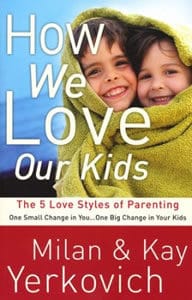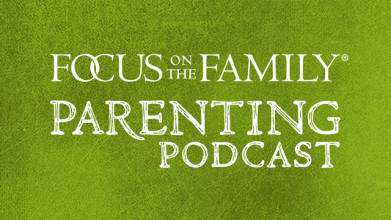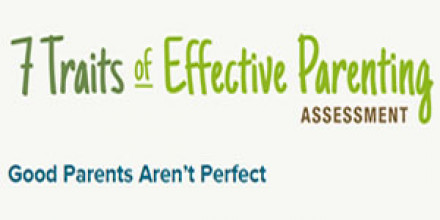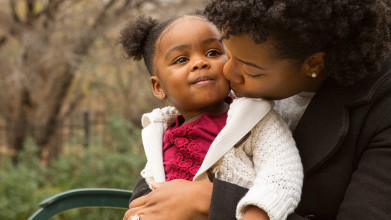Excerpt:
Kay Yerkovich: Hard work has an amazing reward at the end of it, that as we grow, we model for our kids, the importance of growth. And I think it’s one of the most important things we can do to invest as a parent. We’re not going to be a perfect parent, but we have to be a growing parent.
End of Excerpt
John Fuller: That’s Kay Yerkovich reminding moms and dads that as our children grow up, we need to be growing as well and learning how to interact and relate to them in healthy ways. You’ll hear more from Kay and her husband Milan today on Focus on the Family. Your host is Focus president and author Jim Daly, and I’m John Fuller.
Jim Daly: Hey John, last time we featured a very interesting conversation with the Yerkovich’s about five different love styles in children and how those styles affect the ways our kids behave and connect with us. And you know, it’s not uncommon for parents to hit a snag every now and then with kids. Uh, it just happens. They react, you react and you wonder what went wrong, or maybe you’ve got a child whose behavior baffles you, uh, whatever it is, Milan and, Kay, have some great insights that I know you’re going to find helpful, no matter what age your children are. And if you miss the conversation last time, get the download or CD from us, or you can get the Focus app and listen to the program that way. This is really great information for all parents.
John: It is. And we’ll invite you to contact us about that audio or the app, and learn more about the Yerkovich’s book that we’re exploring today. The title is How We Love Our Kids: The Five Love Styles of Parenting. Our number is 800, the letter A and the word FAMILY, (800) 232-6459 or stop by focusonthefamily.com/broadcast.
Jim: Now John, we mentioned last time that we recorded this conversation with Milan and Kay a few years ago, when you and I both had younger teens in the home.
John: Mm-hmm (affirmative).
Jim: And in fact, I shared a story last time about a funny but frustrating parenting moment. When I found, uh, several empty food boxes in our pantry. And I simply wanted my boys to throw away the box when they empty it. It sounds simple, right? But no, it turned into a long discussion where they thought I was overreacting.
John: (laughs). Yeah. I could just hear how that went. We’ve all been there, Jim. Every parent seems to have those situations where we can’t get through to our kids, what we want them to know or do, and that interaction so quickly goes sideways.
Jim: Right? And that’s why we want to return to this conversation with the Yerkovich’s so they can help me and everyone listening.
John: (laughs)
Jim: Uh, because bottom line we want to help our children grow up to be more secure in their relationships with us, with others. And most importantly with God, that’s the long-term goal we’re aiming for.
John: Let’s go ahead and hear part two of our conversation with Milan and Kay Yerkovich on today’s episode of Focus on the Family.
Jim: Uh, last time, we talked about those, um, characteristics, the avoider, the pleaser, the vacillator, the controller, the victim, and then that golden spot, I would say close to God’s heart…
Kay: Mm-hmm (affirmative).
Jim: That secure connector. And, uh, that’s our goal. Uh, we talked a little bit about the avoider temperament and the child, because I asked the question, what does a child look like who’s an avoider? Let’s continue that discussion today. What does that pleaser child look like?
Milan Yerkovich: Pleaser children, uh, end up being caretakers of others. Uh, they are very hypervigilant to look at moods and, and, uh, look on your face. If you look sad, they’re going to want to, to try and help that. And so they can be over-focused on others in trying to make whatever is perhaps a bad mood in you or a problem or a difficulty make it all go away. So you might find, uh, a kid who’s a pleaser, might be a person who cracks jokes a lot is trying to be, have fun a lot, is trying to change the topic, is using diversions and also care taking. And so they’ll, they’ll do stuff around the house to try and make everybody happy. And so this is how I grew up as a child, trying to be this child to compensate for, uh, at times angry outbursts in my home, I would then compensate with those tools that I use to try and cope with my situation as a child growing up.
Jim: Let me ask you this, because some of these attributes that we learn are actually good skills. Um, you’d talk about a person who ends up being a lawyer and negotiate or something like that. They’re a person that’s got to read a room very skillfully, and they got to know where their opportunities are, how to earn the trust of somebody because of their, um, their forthrightness, whatever it might be. So not all of this in terms of the skills you learn are negative, but they’re just part of life.
Kay: Well, that’s very true. I mean, avoiders are very responsible, pleasers are very nice. You know, these are things it’s not like they’re all bad and God uses even the broken parts of us. He uses for our good and for even his glory, which is pretty amazing. I think what we’re looking at here is how can we identify when a child or as a parent when we’re off track and we’re not really building the security we want to build, you know, how can we turn that child around for like the pleaser child for example, they, they tend to lack boundaries. One of our kids was a pleaser child and the other kids took advantage of him.
Jim: You had four kids?
Kay: We had four kids. And I remember one of our boys is definitely a pleaser. And you know, the other kids would just, they’d be unkind. They’d push him too far and he’d never stand up for himself.
John: Uh-huh(affirmative)
Kay: So we had to recognize that and say, you know, he’s nice, but he’s too nice. And so we role played with him and we pretended we were the friends and we gave him some lines to say, if you treat me like that again, I’m not, I’m not gonna play with you anymore. And he was so afraid to do it because he thought, well, the kids won’t like me, or they’ll never have me back. But you know, I remember the day he finally delivered the line and he came home and he said, Oh, I did it? I don’t know. And the next day, his friend not only played with them, but he treated him way better.
Jim: That’s an amazing thing. And, and it, what strikes me as you’re trying to equip your children to live in the most healthy spot they can.
Kay: Right.
Jim: And, uh, boy, it’s tough, but even giving them the goal, here’s what we’re trying to hit.
Kay: Right.
Jim: That secure attachment area. And these would be the attributes. I mean, I could see that in one of my boys, I could see them easily being that pleaser. In fact, I asked him that question, um, you know, how are you doing in your friendships at school? And he says, well, everybody likes me.
Kay: Right.
Jim: And that’s a comment from a pleaser, right?
Kay: It is. And it’s like-
Jim: I’m sorry?
Kay: Well, there’s, there’s something great about that. Everybody does like a pleaser, but the question is, is, are they taking advantage of him as well?
Jim: Talk about the Vacillator child.
Kay: The vacillator child wants your attention when you’re least able to give it.
John: (Laughs)
Kay: It’s almost like- [crosstalk 00:07:07]
Jim: That is not in every child?
Kay: Well, the vacillator, particularly, it’s kind of like always a test. Um, you know, they, they kind of have their longing for more connection turned on high. And they’re looking for moments when you’ll connect with them, but then sometimes you’ve made them wait. So they’re also mad. So they’ve got this push pull inside. I want you, but, well, I’m mad because you made me wait and what these vacillator kids are really tuned in to is my parent present with me or not.
Jim: And that’s your grade as a parent, they’re grading you in that curve[crosstalk 00:07:39]
Kay: They kind of, they really are. And it’s, you know, many times for these kids, they, they have a parent who’s home, but not present.
Jim: Yes.
Kay: Sometimes more, not present than present. So these kids are really protesting that lack of connection. And I, one of the things we, we see in these vacillator kids is they’re longing for someone to sit down with them without the cell phone, without the, um, the distractions and really be present with them.
Jim: Huh. Interesting. So that, that busy, let me just say the busy dad who, you know, work comes before everything, even on the weekends, perhaps he’s on the phone that vacillator child’s really gonna have a difficult time with that father.
Kay: They are. And what happens is over time, they get angry and they start to protest. And these vacillator kids they’ll tell you exactly what’s wrong with you and what you need to do to fix it. Uh, and sometimes in a way that’s very immature and not very, um, it’s very hard to swallow. So I think part of what we have to do is teach this kid how to ask for what they need and want without doing it in an unkind way.
Jim: Huh.
John: Are they asking in an unkind way, just to prompt the response?
Kay: They’d rather fight than have no response.
Jim: So they’re good button pushers.
Kay: They’re really good button pushers.
Jim: (Laughs)
Milan: And, and what we, what we say in our book is, is that their behaviors are immature ways of expressing a deep need. And if we only work on correcting the behaviors and saying, well, you can’t be mad, what are we doing? We’re not trying to ask what is the message that your anger is trying to tell me?
Jim: Right, you’re damming up the emotion-
Milan: We’re damming up the emotion-
Jim: Bursting it up.
Milan: So what I’m going to do with it, vacillator kid, who I’ve had many of them in my office, as I look at them and I put everything aside and I look at him and I say, you know, you’re really angry, aren’t you? What made you angry? Who made you angry?
Jim: Can they articulate it?
Milan: Yes. I’ll say, what are you feeling? I’ll hand him a feelings word list. And what else are you feeling underneath that anger? And or what if it’s my child, I’ll say, what did I do that made you angry? I’m not just going to respond to your anger right now. I’m going to ask you, what did you, what did I do that made you angry? And I want to get them talking because one of the greatest reliefs to anger is the ability to vent and to get that out. And so if it’s about me, if it’s about somebody else, I want to not just correct the behavior. And a lot of times in our Christian homes, it’s about correcting the behavior and character and all that. And we don’t stop and ask what was driving that bus.
Jim: Huh.
Milan: Well, dad, you’ve been so busy at work. You haven’t even talked to me for two days, I miss you. Well, that’s a different conversation than stop being angry and treat him, you need to treat me with respect-
Jim: Yeah.
Milan: Or you supposed to honor your father and mother? I can, I can whip off those kinds of retorts left and right. Instead of stopping and saying, she’s not, he’s not, I wonder what happened.
Jim: Yeah. No. I mean, that’s wonderfully said, and I think it’s unfortunate that, uh, again, we work so hard vocationally to hone a skill-
Kay: Mm-hmm (affirmative).
Jim: And be the thing we need to be. But in this area of parenting particularly, um, we just kind of glide through it and the kids glide through it. And at the end you say goodbye. When they’re 18 or 19, they go off to college and then you see them occasionally on the holidays. Um, it’s unfortunate because as Christians, we need to be intentional about what we’re trying to work on with God to prepare that child to be a very healthy adult. And that’s, what’s so fun about this. Let me ask you this though. And if I’m struggling to connect with my child, because they have a different attachment style from me, what can I do to understand it and begin to, um, I guess master it so that I can be more productive in that parenting role?
Kay: Well, it’s important to say we didn’t even get any of this until our kids were older.
Milan: Yeah. You and me personally.
Kay: Yes.
Milan: Yes. We were just learning things.
Kay: One of the first goals we made was we’re going to have conversations that include feelings.
Milan: Our own as well.
Kay: Our own and the kids and Kevin was in school at this point.
Milan: Mm-hmm (affirmative)
Kay: And his stress response is to get testy and difficult to live with when he-
Jim: A word like whatever?
Kay: Yeah, yeah, like whatever, or I’m not going to do that. Or, you know, just oppositional-
Jim: That sounds boring.
Kay: Oppositional.
Jim: Yeah.
Kay: Well, that’s what he said. So when we said go pick these three feeling words he’s I’m not, that’s dumb psychology. I’m not doing that. And I said, well, honey, I said, I can tell you’re stressed. And I said, until you give me the three words, we’re not going to have the car keys. Aren’t going your direction. So…
Jim: (laughs).
Milan: That’s called bribery.
Kay: That’s called bribery.
Milan: And it works (laughs).
John: I like leverage-
Milan: Leverage?
Kay: Leverage, so-
Milan: It’s a little bit more positive.
Kay: I drew some circles on a page, the circles church, the circles friends, a circle sports, the circle of school, pick three feeling words for each circle. Well, as the conversation went on, he started crying.
Jim: Huh?
Kay: He was shocked. He didn’t realize how stressed he was and all of these areas. And when we begin to list all of the things that were stressing him, he started to cry. And he said, I didn’t even know I was this stressed. And I said, well, honey, I did. And I said, just remember that when you can talk about all these things and you can share the feelings and you can identify them, you learn something about yourself. And I said, do you feel better than you did an hour ago? And he said, yeah, I really do. Now-
Jim: Let me ask you just for clarification, if you can share these?
Kay: Yeah.
Jim: I don’t want to be too intrusive here, but what were some of the words that he listed?
Kay: Oh gosh. Um, I remember that he had a girlfriend at the time and they were having a lot of discord. So he chose words like, um, confused, annoyed, frustrated. He had a coach that he dearly loved, but you know, he hurt his ankle and he had an injury. So he was, he listed words of, uh, very frustrated in a sports and disillusioned and disappointed and just broken hearted was one of his words. I’m brokenhearted cause I can’t really play, and like I wanna play. And then in church I remember one of the things that was really stressing him there as he was, he was a senior and he was having to go away to school-
Jim: Uh.
Kay: And uh, he was going to be leaving all his friends and he’s like, I just can’t imagine having to leave my friends in a year and-
Jim: Make new ones.
Kay: And make new ones.
Jim: Yeah.
Kay: And you know, those are some of the things I remember. And I think sometimes just to sit down with your kids and say, let’s meet everything that’s a stressor right now. And I think what we found is, is that we learned to do this in our own marriage and in our, our relationships, uh, we were more open to hearing their feelings and, and pulling them out instead of just trying to fix them and make them go away.
Milan: Yes, we separated whatever the incident was and trying to connect with the thoughts and the emotions of that incident. Before we came down with whatever the consequences were going to be, we put a gap in there and we always wanted to know two things. What were you thinking? And what were you feeling right before you hit your brother?
Jim: (laughs) that’s not, I was just laughing because-
Kay: Its not intuitive
Jim: That was the dad.
Kay: Yeah
Milan: That’s right.
Jim: Let me- Cover your feelings before you smacked your brother. Ok.
Milan: But, but here’s, here’s an illustration. And I’ve told this before and the boys know this, but I said, and Kevin says, I don’t want to do this. And I go, well, I’m sorry, you have to do this before you go to the ball game, before you get the keys, I need three words that you were feeling right before you hit your brother. And he goes, okay. I was frustrated. I was, I was, um, uh, what else? And he is stammering and stuttering like this. And I said, well, here’s the feelings word list? And he goes, um, I felt violated and I felt, uh, duped. I go, well, what happened? He said, you know, I was in the shower and he took my last pair of white clean socks. I was going to wear tonight. And my brother just took them and put them on and ran off with them. I said, well, no wonder you were angry. No wonder you hit him. No wonder you felt violated duped and, and stressed. I said, we have a non tol- you know, it’s non tolerance policy here for hitting. But I said, you know, that tells me a little bit better. Maybe I needed to talk with John also. And I said, I want you to be thinking what we’re going to do about this. Oh, by the way, the door that’s broken that you guys bashed into. And we’ve got to figure out how to pay for that. Well, let’s discuss that tomorrow, but I need to go talk to your brother about taking your socks. So I slowed the whole process way down.
Jim: Uh-huh (affirmative). Took some of the stress out of it.
Milan: Which he, you know, it, it, it didn’t excuse what happened.
Kay: No, he’s still got a consequence and he still had to pay for the door.
Milan: Yeah.
Kay: However he felt heard and listened to. And like someone did understand that the sequence of events and that his feelings were valid. It was how he dealt with his feelings that we needed to work on.
John: Well, that sounds like a really good plan of action. And that’s just one example of how Milan and Kay Yerkovich’s book, How We Love our Kids: The Five Love Styles of Parenting can help you navigate some challenging interactions in your family. Now, this is a tremendous resource and I do hope you’ll get in touch with us for your copy. Our number is 800, the letter A and the word FAMILY, or you can stop by focusonthefamily.com/broadcast. Let’s go ahead and return now to the conclusion of this great conversation with the Yerkovich’s on Focus on the Family.
Jim: Um, You talk about some of the gifts you can give to your child. Talk about a couple of those and how you gave them those gifts in your own family. And what do you mean by the gift?
Milan: Well, there’s lots of gifts that we talk about at the end of the book, how we love our kids gifts that you want to give to your child as a legacy. And, um, one of them is what I’m going to call the gift of vulnerability as a parent. We had our three oldest children move out of the house within a period of 18 months, two got married, one moved away and all of a sudden our house was real quiet. And I started to feel triggered and anxious and depressed because I loved having this busy home. And I found that all of a sudden I was being the helicopter parent to my daughter, Kelly.
Jim: And that’s because you’re a pleaser parent or a recovering pleaser?
Milan: But, but, but what was happening, I was getting triggered by the silence in my home and the quietness.
Jim: I can so relate to that. (Laughs)
Milan: So I said to Kelly one day, because I would bug my daughter to pieces and say, well, where are you going? Who’s going to be there. What’s the telephone numbers, how long you had to be there. And then I’d asked her again, where are you going? Who’s going to be there. Are there any parents in supervision, blah, blah, blah, blah, blah. And I would over ask the, uh, helicopter parent. So what I said to her one day was, I said, I need to tell you why I ask you so many questions. And I told her my life story. I told her that I was an anxious child, that quietness triggered me. And when I got triggered, I got anxious. When I got anxious, I started asking questions to settle my own security. And what I said to her was, if you feel like I’m asking you too many questions, I want you to look at me and say, dad, are you feeling anxious?
Jim: So you gave her permission?
Milan: I gave her permission. I was vulnerable and shared my story. And I gave her permission to give me feedback in my life.
Jim: Yeah. Let me ask you this. And you mentioned it, but we didn’t zero in on it Kay. And you talked about when you first started to do this, um, your oldest son was, um, in the last couple of years of high school.
Kay: Yeah.
Jim: Because I’m sure some parents are going, Oh man, um, we’re on our last child. Who’s in high school-
Kay: Right, right.
Jim: And our other two or three are in college or beyond. How do you come back around and maybe have some discussions with your late teen kids or maybe even your early adult children to say, okay, we got to talk this through cause I may have done some things that did not help you as a parent?
Kay: Oh, I love that question because I think every Christian parent should be growing enough where they can look back and have regrets about their parenting because the first one’s a crash test dummy, we don’t know what’s so true.
Jim: I wish we could do this, you know, couple of times in a row.
John: Sorry to all the firstborns out there.
Kay: Absolutely.
Milan: Yes.
Kay: But how healing is it when a parent comes to you and says, Oh, I just learned that feelings are important. And I wish I would’ve known this sooner, but I’m going to make it a real point to learn how to say what I feel. And I’m going to ask you how you feel and would you give me a do-over? Would you give me a chance to just grow even now? And let’s talk about what it was like for you to never be able to have feelings.
Jim: That is so well said, you know, I love the title you have in some ways, uh, how we love our kids. Another way to say that though, is how to understand brokenness.
Kay: Right.
Jim: And what the Lord can do with it and how to get to that better secure place.
Milan: Mm-hmm (affirmative).
Jim: And I think that’s wonderful. And that’s the reason we want to put the tools into the hands of these parents, including me. I think you’re thinking of the same thing, John?
John: I am yeah.
Jim: um, and how to do this better. Uh, Milan someone in the audience is probably thinking, well, that’s great for this couple. I mean, they have a counseling center. This is your vocation. You were a pastor before and now you’re doing counseling. I’m just a dad. I’m just a guy that goes to work every day and comes home and tries to survive. Um, talk about that methodology and the fact that you don’t have to be a counselor to apply these principles. You just need to be in tune.
Milan: We started all of this. As you said, when our oldest son was 14, 11, nine, and one years old, all our kids were that age. We weren’t counselors. We were actually just learning this ourselves. And I think I had to start off with a decision. Am I going to try and do what God wants me to do? God tells us as, as the body of Christ to comfort one another, encourage one another, bear one another’s burdens, confess our sins to one another, pray for one another. Now we didn’t know how to do that. And I have to decide, I don’t care what I do for a profession. Do I want to learn how to do that, maritally and with my kids and with my friends? Secondly, the way I started that is I simply started with that feelings word list. I would say, what am I feeling today? And I would tell Kay, and I would tell the Lord what I was feeling today. Then I’d asked, Kay, I’d asked my kids so you don’t look real happy right now. You look sad. You look depressed. I would reflect and hold up to them, when I thought I was seeing on this level feelings wordlist. And I’d say you pick a word off this list and tell me how you feel. I just want to know. So I can love you there and pray for you. God tells us to do these one another’s of scripture. It was a decision. And then an action.
Jim: Yes. Speak to that. mom or dad who’s got so much going on. Life is hectic. If you haven’t noticed-
Kay: I have noticed.
Jim: We’re both working, we get home, we’re tired. We got to get dinner ready. And then we got to clean up. We got to do laundry. We got so much to do to do this. Just sounds like an overwhelming amount of more work.
Kay: You know, sometimes when you start to make a change, it is more work and it is uncomfortable because all growth is uncomfortable. Oh, but the results, I mean, we see such a difference between our fourth child because she got so much of this and it’s like, what I see in her, even as a teenager and as a young woman and now a mom astounds me.
Jim: Yeah.
Kay: So I think, you know, you have to realize that that hard work has an amazing reward at the end of it, that as we grow, we model for our kids, the importance of growth. And I think it’s one of the most important things we can do to invest as a parent. We’re not going to be a perfect parent, but we have to be a growing parent.
Jim: Yeah.
Kay: We have to make the time and it can be one small change at a time.
Jim: Yeah.
Kay: It doesn’t have to be a big, I’m going to try and do it all. Just the feelings, just start there.
Jim: John, I really appreciate that final encouragement from Kay Yerkovich as well as all of the parenting wisdom and insight she and Milan have shared with us over these past two days. You know we’ve said this before, it’s so important to get life’s priorities in the right order. It’s not about your career, your accomplishments, or how much money you made or the stuff that we often give way too much attention to. Uh, when this life comes to its end and you’re on that final bed where you only have a few moments left, you’re not going to care about anything else, but those relationships that are most important to you, your spouse, your children, your grandchildren, that’s the legacy that you’ll leave behind. And if you’re feeling inadequate as a parent or facing a struggle with your children, I hope you’ll contact us. That’s why Focus on the family is here. We’ve got lots of great resources for moms and dads to do it better because we want to equip you to be the best parent you can be.
John: Mm-hmm (affirmative). Yeah, we do. And, um, we’re a phone call away to learn more about the Yerkovich’s book, How We Love Our Kids:, The Five Love Styles of Parenting. We’d be happy to send a copy of that to you when you make a gift of any amount to Focus on the Family today. And let me also mention our free seven traits of effective parenting assessment, which is an online survey. It takes just a few minutes to fill out. And it’ll help you determine what’s working well in your family and point out a few areas perhaps that you might make some improvements in. Learn more about all of the parenting resources we have just call 800 the letter A and the word FAMILY, (800) 232-6459, or donate online and get more details at focusonthefamily.com/broadcast.
Jim: And John, before we close, I want to encourage our listeners to partner with us financially so that we can continue to equip and encourage parents. Like hopefully we’ve done today. Each year we hear from hundreds of thousands of moms and dads who are seeking help with a major transition in their child’s life, or in some cases they’re facing a significant crisis with their children. And it’s only because of your faithful support through prayer and financial giving that we’re here to meet those needs in a number of ways. One of the best ways you can help is by making a monthly pledge to Focus on the Family, that way working together, we can be there when hurting families need us the most. And let me say thank you to the many friends who have supported Focus in the past. But, if it’s been a while since we’ve heard from you, I get it, but we would really appreciate hearing from you and encourage you to partner with us today.
John: We’d love to hear from you. And if a monthly pledge is more than you’re able to afford or commit to at this time, a one-time donation will also benefit the families that we’re serving together. So again, donate at focusonthefamily.com/broadcast, or when you call 800, the letter A and the word FAMILY. Coming up next time, a really amazing story about how a climb up Mount Everest transformed one couples marriage.
Teaser:
Rachel Earls: I get to watch my husband laugh with our boys, you know, play with them. Like there’s a very real possibility I never would have gotten to experience that. You know, so I just see it through new eyes now. And I want to live in those little moments and know that they are so precious, um, and such a gift.























